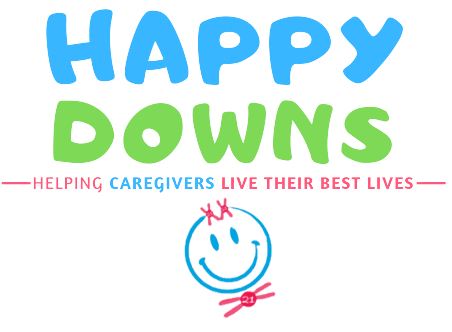As the family caregiver of an adult or teenager who has Down Syndrome (DS), you are fully aware that your loved one needs help in some areas of life, e.g., making financial or medical decisions. You are also aware that they do not need help in other areas, e.g., cooking meals, personal hygiene or cleaning the home. When they hit that “18th birthday” mark, the law considers them adults and what should we as caregivers do then, to help them in the areas that they do need assistance in? What is legal guardianship and is it the answer?
Legal guardianship for adults with disabilities is an option we hear often, whether via the school system, healthcare professionals or even some of our family members. But, what does this really mean for us and our loved one who has Down Syndrome? What impact will legal guardianship have on our loved ones and on us?
What Is Legal Guardianship?
This is where we go to court and request a judge to give us the authority to make some or all decisions on behalf of our loved one who has Down Syndrome, on the premise that our loved one cannot make these decisions for themselves. Therefore, the law is essentially revoking the rights of one of its citizens (our loved one who has DS) and therefore this decision has to be taken seriously.
There are different types of guardianship:
- Guardianship of the Person – this limits the guardian to making decisions relating to personal care, e.g., medical treatment decisions, deciding where the person lives, making daily decisions about how your loved one accesses food, clothing, recreational activities, etc. Whilst the guardian does not have to live with the person under their care, they must ensure that the person with DS is receiving proper care in areas such as, but not limited to, medical, educational, employment and end-of-life decisions.
- Guardianship of the Estate – this limits the guardian to making decisions relating to the estate of the person with DS. Depending on where you live, this is known as a Conservatorship and the person responsible for making these decisions is called a Conservator instead of a Guardian. The Conservator should use the income of the person with DS (not their own) to pay their bills and apply for government assistance like Medicaid or Medicare (in the United States). The Conservator will also handle insurance issues, hold the power to approve/disapprove financial contracts, etc.
- Full Guardianship – this gives the guardian powers to make decisions relating to every aspect of the Person and Estate. This guardian is called a Plenary Guardian.
- Partial/Limited Guardianship – the person with DS is determined by the court to retain some capacity for rational decision-making and thus, is not declared incompetent. The guardian therefore has been granted only some powers, e.g., medical decisions powers, whilst the person with DS can make decisions in every other area of their life.
Oftentimes we assume that because someone has been diagnosed with a disability that they automatically need guardianship. This is not true. Every family’s case is different and thus, we must approach our situation from an individualistic view, not a broad-brush approach. If your loved one has the capacity to execute powers of attorney, i.e., they can choose you or someone else (who is trustworthy) to make certain decisions for them, e.g., medical decisions, then guardianship/conservatorship is not necessary.
Also, please bear in mind that by the court granting guardianship/conservatorship, your loved one is deemed incapacitated and persons who are deemed incapacitated are not allowed to do certain things (depending on where you live), e.g., vote, enter into contracts, sign a lease, make significant purchases like a house, make a will or living trust or get a loan or mortgage.
Responsibilities of a Guardian
Responsibility will vary based on the type of guardianship granted. Also, please ensure that you get the full details of your own case to completely understand your full responsibilities. Nevertheless, typical responsibilities may include, but are not limited to:
- advocating for the person’s legal rights and independence,
- making medical care decisions and arranging for needed treatment,
- applying for health insurance and other needed benefits for the person with DS,
- providing basic everyday needs and safety,
- providing for the social, recreational, educational and future needs of the person with DS,
- ensuring the person with DS has a living situation that is safe and is the least restrictive option.
The responsibility of a guardian ends when:
- the person with DS dies,
- the guardian dies (but someone else will have to be appointed by the court. It is good to have someone has Co-Guardian in cases like this),
- the guardian is unable to perform their duties,
- the guardian petitions the court the remove them as guardian (in this case the court often appoints the person whom the caregiver identified as “Successor Guardian”. N.B. A Co-Guardian would have been useful in this situation as well).
Who Can be a Guardian?
Anyone who is:
- at least 18 years old
- is not of unsound mind
- not diagnosed with a disability
- is not a convicted felon. This depends on the crime, e.g., if they were convicted of harming or threatening persons with a disability or an elderly person, including sexual offenses, they cannot be guardians.
Entities may also act as guardians, e.g., corporations qualified to execute trusts may be guardians of the estate. Also, any not-for-profit corporation that the court deems fit to provide the care and support for the person can be a guardian.
Please bear in mind that other things may disqualify you from being a guardian. For example, in the United States of America, parents who have access to receive a Medicaid stipend to be their child’s paid caregiver, will not be able to be their legal guardian as well. Therefore, it is important, whenever you are deciding on any agreement/status relating to your loved one, to know how it will affect other agreements.
The Cost of Guardianship
Legal fees will vary widely, depending on your location and other factors such as:
- the number of hearings your lawyer has to attend,
- the amount of investigation and documentation the court requires,
- if there is any dispute within the family that causes delays, etc.
Some of the legal fees that may apply include:
- Attorney fees
- Service fees (e.g., for the serving of papers)
- Court fees
- Expert fees (medical, psychiatric, vocational, disability experts).
If the person with DS has an estate, then the court may dictate that the legal fees be paid from this estate. If the person with DS does not have an estate, then the cost usually falls on the family caregiver. Bear in mind that the court may have a policy as to how the fees are paid, so ensure that you find out what these policies are, so that you are not caught off guard by any expenses. Also, check to see if there are any legal aid organizations in your area or any local/national Disability Foundations that can assist you with the fees.
Lastly, the guardian may be allowed to charge a fee for their services – find out if this applies to you based on where you are located.
Is Guardianship the Right Choice?
This solely depends on the reality of your family’s situation. We advise that you bear in mind how guardianship/conservatorship affects the rights of your loved one with DS to act on their behalf and thus, try your best to honor your loved one’s pride and dignity by using the least restrictive means possible.
Choosing the right level of support that your loved one’s needs is no easy feat. So, start having these conversations with your family (including your loved one) as early as possible, seek professional advice, understand the laws of your country/state and do what is best for your family.

